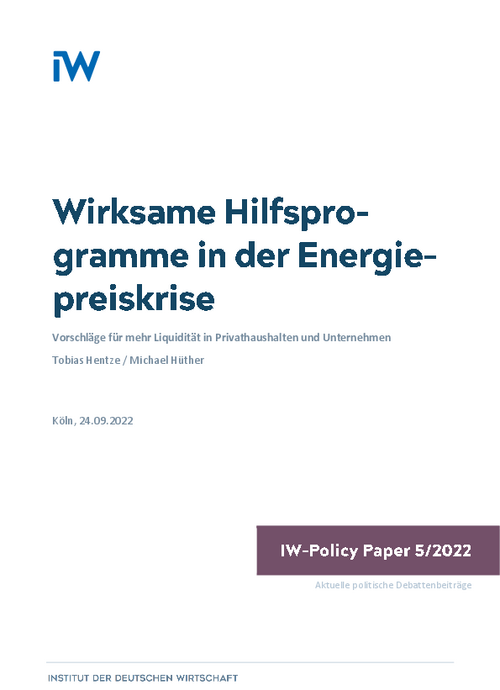The energy price crisis is a huge challenge for economic policy. With the three relief packages, the government has given some important support, but the economic policy lacks a stringent line. All measures should currently have the top priority to secure liquidity for private households and companies over the winter.

Effective aid programs in the energy price crisis: Proposals for more liquidity in private households and companies

The energy price crisis is a huge challenge for economic policy. With the three relief packages, the government has given some important support, but the economic policy lacks a stringent line. All measures should currently have the top priority to secure liquidity for private households and companies over the winter.
To that end, simple and effective tools are the way to go. Intervening in price mechanisms or changing the market design can lead to unexpected distortions and should therefore be carefully considered. Therefore, the approach of making direct payments to private households and companies that are as targeted as possible is reasonable. In the case of low-income private households, this must be done through non-repayable grants. For companies, on the other hand, liquidity aids are the first choice.
In addition to loans, the tax policy offers potential to increase liquidity without risking excessive subsidies or creating high free-rider effects. Like the corona pandemic, politicians should give companies generous deferral options for income and sales taxes and, for this purpose, partially reimburse advance payments already made. At the same time, the options for offsetting tax losses should be expanded.
The introduction of a negative tax as a simple procedure to support the solvency of companies would be consistent and an opportunity for a structural improvement in case of future crises.

Effective aid programs in the energy price crisis: Proposals for more liquidity in private households and companies

More on the topic

Challenges for the debt brake
In 2019, Bardt et al. (2019) initially presented a comprehensive estimate of the unmet public investment needs in Germany not covered in household planning at the time, totaling around €460 billion over ten years.
IW
Global and European corporate tax reform concepts
The harmonization of corporate taxation at an international level has been on the political agenda for many years. Both the Organization for Economic Cooperation and Development (OECD) and the European Commission have presented reform projects in this regard, ...
IW